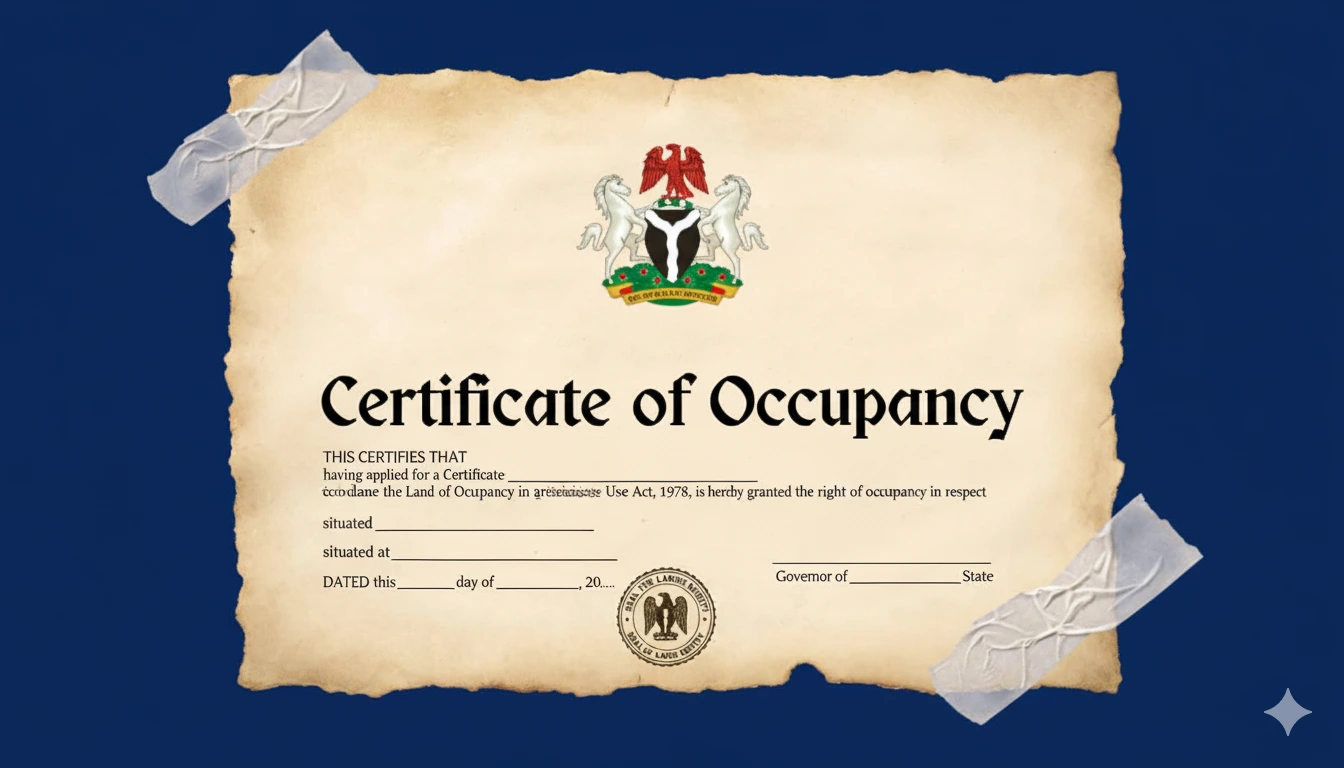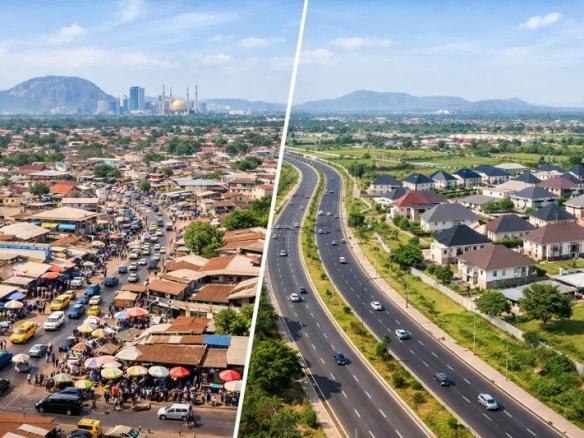Introduction: Why a C of O Matters in Nigerian Real Estate
If you plan to invest in land or property in Nigeria in 2025, there is one document you cannot afford to ignore—the Certificate of Occupancy (C of O). This powerful legal certificate is your proof of ownership, your shield against fraud, and your guarantee that your land won’t be snatched away by government takeover or land grabbers (Omonile).
Sadly, thousands of property buyers still fall into painful traps every year because they skip the C of O step. They buy land cheaply without proper titles, only to wake up one day and discover the land belongs to the government or multiple families.
This guide is your step-by-step blueprint to understanding the Certificate of Occupancy in Nigeria. By the end, you’ll know:
- What a C of O really means
- Why it is critical in 2025’s competitive property market
- How to apply for and secure one
- How much it costs across different states
- The common mistakes to avoid
What Is a Certificate of Occupancy (C of O)?
A Certificate of Occupancy (C of O) is an official legal document issued by a state government in Nigeria. It certifies that a person or company has been granted the right to occupy and use a parcel of land for a specific period—usually 99 years.
Key Points You Must Know:
- Established under the Land Use Act of 1978.
- Proves government allocation of land to you.
- Without it, your ownership can be challenged anytime.
- Required by banks and mortgage companies before approving property loans.
Think of the C of O as the birth certificate of your land. Without it, the land’s legal identity is incomplete.
Why Is a Certificate of Occupancy Important in 2025?
The Nigerian real estate market is exploding, especially in Abuja, Lagos, and Ogun. But with rapid growth comes fraud, disputes, and government reclamations. Having a C of O protects you from these risks.
Benefits of Having a C of O:
- Legal Ownership ✅: Shields you from multiple claims.
- Access to Loans : Banks accept it as collateral.
- Land Value Appreciation : Plots with C of O are worth far more.
- Fraud Protection ️: Eliminates Omonile scams.
- Peace of Mind ️: No midnight shock of demolition or repossession.
In short, the C of O doesn’t just secure your land—it supercharges its value.
Difference Between C of O and Other Land Titles
Many buyers get confused. Not all documents are equal.
- R of O (Right of Occupancy): A temporary approval pending full title.
- Deed of Assignment: Legal transfer of ownership between individuals.
- Governor’s Consent: Needed before selling land with C of O.
If your land doesn’t have a C of O, you may need to upgrade. Don’t assume a survey plan or deed equals full ownership.
Step-by-Step Process of Getting a C of O in Nigeria (2025)
While processes vary across states (Lagos vs Abuja vs Ogun), the general steps are:
- Obtain Land Allocation
- Apply at the state’s land registry or development authority.
- Submit C of O Application Form
- Fill with your personal/company details.
- Attach Supporting Documents
- Survey plan
- Tax clearance certificate
- Passport photographs
- Deed of Assignment (if land was purchased from a seller)
- Verification & Site Inspection
- Officials visit the land to confirm boundaries.
- Assessment & Payment of Fees
- Processing fees
- Ground rent
- Administrative charges
- Governor’s Signature
- Final approval by the state governor.
- Issuance of Certificate
- Collect your C of O at the land registry.
Cost of Obtaining a C of O in Nigeria (2025 Update)
The cost varies depending on state, land size, and location:
- Lagos State: ₦500,000 – ₦5,000,000
- Abuja (FCT): ₦800,000 – ₦6,000,000
- Other States: ₦300,000 – ₦3,000,000
Additional Charges You Must Budget For:
- Survey fees
- Ground rent
- Legal/professional fees
Common Challenges in Getting a C of O
- Delays ⏳: Often 6 months–2 years.
- High Costs : Discourages many buyers.
- Fraudulent Agents ⚠️: Fake C of O documents circulate widely.
- Government Bureaucracy ️: Multiple approvals slow the process.
Pro Tip: Always use trusted real estate professionals like Realtor Kingsley to fast-track and avoid fraud.
How Long Does It Take to Get a C of O in Nigeria?
- On Paper: 3 to 6 months.
- In Reality: Often 1–2 years due to bureaucracy.
Hiring professionals can cut down the waiting time drastically.
FAQs About Certificate of Occupancy (C of O) in Nigeria
Q1: What is the validity period of a C of O?
A: 99 years, after which it must be renewed.
Q2: Can land exist without a C of O?
A: Yes, but ownership may be challenged.
Q3: Can I use C of O land as collateral?
A: Yes. Banks and financial institutions accept it.
Q4: What happens when my C of O expires?
A: You must apply for renewal at the land registry.
Q5: Can I buy land without a C of O?
A: Yes, but it’s safer to buy from sellers with C of O or process one yourself.
Protect Your Investment Today
Getting a Certificate of Occupancy is one of the smartest, most powerful decisions you’ll ever make in Nigerian real estate. It gives you security, financial leverage, and long-term value appreciation.
Don’t throw your money into risky plots without documents. Instead, secure your future with verified lands backed by strong titles.
Contact Realtor Kingsley today to access 100% verified properties with C of O and avoid the headaches of fraud, land disputes, and government seizures.
Because when it comes to land in Nigeria, documentation is destiny.





Join The Discussion